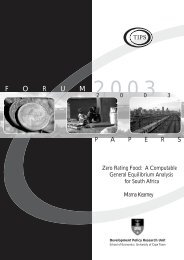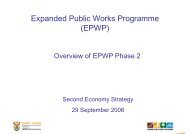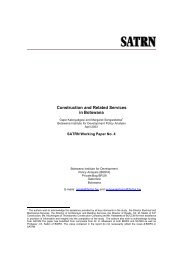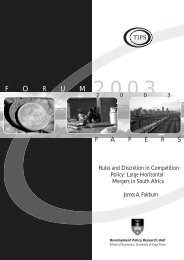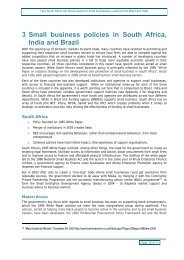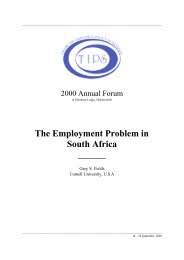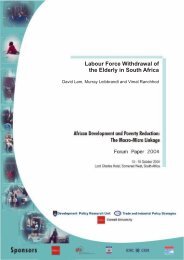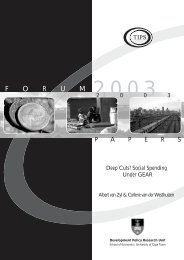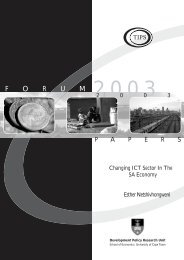(AsgiSA) Annual Report 2008 - South African Government Information
(AsgiSA) Annual Report 2008 - South African Government Information
(AsgiSA) Annual Report 2008 - South African Government Information
You also want an ePaper? Increase the reach of your titles
YUMPU automatically turns print PDFs into web optimized ePapers that Google loves.
Accelerated and Shared Growth Initiative for <strong>South</strong> Africa<br />
ANNUAL REPORT<br />
<strong>2008</strong><br />
Budgets for implementing projects using labour-intensive EPWP methods remain the responsibility of<br />
provincial departments responsible for those particular projects – in this sense, the EPWP does not have<br />
a direct project budget.<br />
Phase One, which was implemented between 2004 and 2009, achieved its target of creating more than<br />
one million part-time employment opportunities. Table Five reflects full-time equivalent employment<br />
opportunities.<br />
Table 5: Estimated full-time equivalent employment on public works programmes,<br />
2004/05 – 2007/08<br />
2004/05 2005/06 2006/07 2007/08<br />
Economic 286 222 1 222 1 553<br />
Environment and culture 15 944 23 882 26 658 23 075<br />
Infrastructure 52 891 28 188 34 738 77 816<br />
Social services 1 965 10 838 23 083 43 916<br />
Total 71 086 63 130 85 701 146 360<br />
Source: National Treasury (<strong>2008</strong>), MTBPS<br />
From 2009 to 2012, R4.2 billion has been allocated to Phase Two of the EPWP. This will include a new<br />
EPWP grant incentive for municipalities aimed at providing them with incentives to increase the number<br />
of employment opportunities on infrastructure projects. During EPWP Phase One, municipalities did<br />
not significantly adopt labour-intensive approaches to infrastructure implementation.<br />
The extension of this programme targets 400 000 full-time equivalent longer-term jobs in the social<br />
and municipal services sectors, home-based and community care, as well as project-based employment<br />
in infrastructure and environmental protection, in adult literacy initiatives and in programmes<br />
delivered through non-governmental organisations. A new modality for delivery will be the Community<br />
Work Programme in which unemployed poor people will be employed for two days a week on communal<br />
projects developed and agreed to by poor communities.<br />
57



